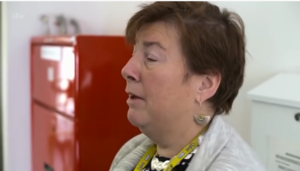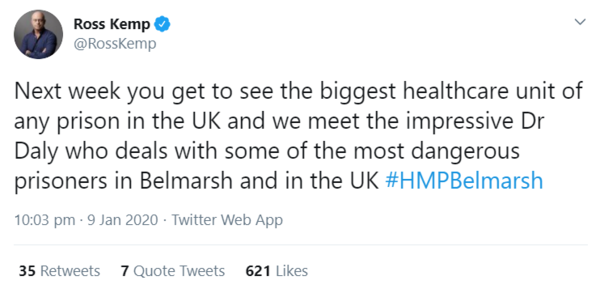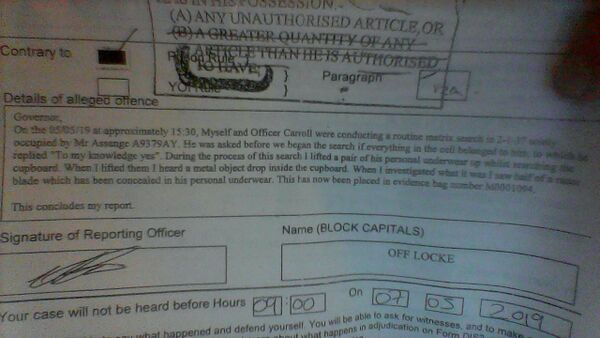Document:Your Man in the Public Gallery: Assange Hearing Day 17
| I am going to write to Judge Baraitser applying for a copy of the transcript of Lewis cross-examining Professor Kopelman on the razor blade, with a view to reporting James Lewis QC to the Bar Council. I do wonder whether the General Medical Council might not have reason to consider the practice of Dr Rachel Daly in this case. |
Subjects: Julian Assange/Imprisonment, Rachel Daly, Michael Kopelman, James Lewis QC, Edward Fitzgerald QC, Nigel Blackwood, Sondra Crosby, Internet Archive, Cryptome
Source: Craig Murray's Blog (Link)
★ Start a Discussion about this document
Your Man in the Public Gallery: Assange Hearing Day 17
During the hearing of medical evidence the last three days, the British government has been caught twice directly telling important lies about events in Belmarsh Prison, each lie proven by documentary evidence. The common factor has been the medical records kept by Dr Daly, head of the jail’s medical services. There has also been, to put it at its very lightest, one apparent misrepresentation by Dr Rachel Daly. Personally, I am wary of the kind of person who impresses Ross Kemp.[1]
Here is a still of Dr Daly from Ross Kemp’s documentary on Belmarsh Prison.
This is Mr Kemp’s description of the medical wing at Belmarsh:
- “Security is on another level here with six times more staff per inmate than the rest of the jail.”
While in the medical wing or “healthcare”, Julian Assange was in effect in solitary confinement, and three psychiatrists and a physician with extensive experience of treating trauma have all testified in court that Assange’s mental and physical condition deteriorated while he was in “healthcare” for several months. They also said he improved after he left “healthcare”. That says something profound about the “healthcare” being provided. The same doctors testified that Assange has a poor relationship with Dr Daly and will not confide his symptoms or feelings to her, and this has also been asserted by defence counsel.
That is all essential background to the lies. Now let me come to the lies. Unfortunately to do so I must reveal details of Julian’s medical condition which I had withheld, but I think the situation is so serious I must now do that.
I did not report that Professor Michael Kopelman gave evidence that, among other preparations for suicide, Julian Assange had hidden a razor blade in his folded underwear, but this had been discovered in a search of his cell. As I did report, Kopelman was subjected to an extremely aggressive cross-examination by James Lewis, which in the morning had focused on the notion that Julian Assange’s mental illness was simply malingering, and that Kopelman had failed to detect this. The razor blade was a key factor in Lewis’s browbeating of Kopelman, and he attacked him on it again and again and again.
Lewis stated that Kopelman “relied on” the razor blade story for his diagnosis. He then proceeded to portray it as a fantasy concocted by Assange to support his malingering. Lewis asked Kopelman repeatedly why, if the story were true, it was not in Dr Daly’s clinical notes? Surely if a prisoner, known to be depressive, had a razor blade found in his cell, it would be in the prison medical records? Why had Prof Kopelman failed to note in his report that there was no evidence for the razor blade in Dr Daly’s medical records? Was he hiding that information? Was it not very strange that this incident would not be in the medical notes?
In an attempt to humiliate Kopelman, Lewis said:
- “You say you do not rely on the razor blade for your diagnosis. But you do rely on it. Let us then look at your report. You rely on the razor blade at paragraph 8. You mention it again at paragraph 11a. Then 11c. Then paragraph 14, paragraph 16, 17b, 18a. Then we come to the next section and the razor blade is there at paragraph 27 and 28. Then again in the summary it is at paragraphs 36 and again at paragraph 38. So tell me Professor, how can you say that you do not rely on the razor blade?”
[I do not give the actual paragraph numbers; these are illustrative].
Lewis then went on to invite Kopelman to change his diagnosis. He asked him more than once if his diagnosis would be different if there was no razor blade and it were an invention by Assange. Kopelman was plainly unnerved by this attack. He agreed it was “very odd indeed” it was not mentioned in the medical notes if it were true. The plain attack that he had naively believed an obvious lie disconcerted Kopelman.
Except it was Lewis who was not telling the truth. There really was a concealed razor blade, and what Assange had told Kopelman, and what Kopelman had believed, was true in every single detail. In a scene straight out of a TV legal drama, during Kopelman’s testimony, the defence had managed to obtain the charge sheet from Belmarsh Prison – Assange had been charged with the offence of the razor blade. The charge sheet is dated 09.00 on 7 May 2019, and this is what it reads:
- Governor,
- On the 05/05/19 at approximately 15.30, myself and Officer Carroll were conducting a routine matrix search in 2-1-37 solely occupied by Mr Assange A9379AY. He was asked before we began the search if everything in the cell belonged to him, to which he replied “To my knowledge yes”. During the process of this search I lifted a pair of his personal underwear up whilst searching the cupboard. When I lifted them I heard a metal object drop inside the cupboard. When I investigated what it was I saw half of a razor blade which had been concealed in his personal underwear. This had now been placed in evidence bag number M0001094.
- This concludes my report
- Signed
- Off Locke
I was later shown a copy and got a quick shot:
When on Tuesday Edward Fitzgerald QC produced this charge sheet in court, it did not appear to be news to the prosecution. James Lewis QC panicked. Rather too quickly, Lewis leapt to his feet and asked the judge that it should be noted that he had never said that there was no razor blade. Fitzgerald responded that was not the impression that had been given. From the witness box and under oath, Kopelman stated that was not the impression he had been given either.
And it was most certainly not the impression I had been given in the public gallery. In repeatedly asserting that, if the razor blade existed, it would be in the medical notes, Lewis had, at the very least, misled the witness on a material question of fact, that had actually affected his evidence. And Lewis had done so precisely in order to affect the evidence.
Panicking, Lewis then gave the game away further by making the desperate assertion that the charge against Mr Assange had been dismissed by the Governor. So the prosecution definitely knew rather more about the events around the razor blade than the defence.
Baraitser, who was aware that this was a major car crash, grasped at the same straw Lewis was clinging to in desperation, and said that if the charge had been dismissed, then there was no proof the razor blade existed. Fitzgerald pointed out this was absurd. The charge may have been dismissed for numerous reasons. The existence of the blade was not in doubt. Julian Assange had attested to it and two prison warders had attested to it. Baraitser said that she could only base her view on the decision of the Prison Governor.
However Baraitser may try to hide it, Lewis attacked Prof Kopelman over the existence of the blade when Lewis gave every appearance afterwards of a man who knew full well all along that there was compelling evidence the blade did exist. For Baraitser to try to protect both Lewis and the prosecution by pretending the existence of the blade is dependent on the outcome of the subsequent charge, when all three people in the cell at the time of the search agreed to its existence, including Assange, is perhaps Baraitser’s most remarkable abuse of legal procedure yet.
After his evidence, I went for a gin and tonic with Professor Kopelman, who is an old friend. We had no contact at all for two years, precisely because of his involvement in the Assange case as a medical expert. Michael was very worried he had not performed strongly in his evidence session in the morning, though he had been able to answer more clearly in the afternoon. And his concern about the morning was because he had been put off by the razor blade question. He had firmly understood Lewis to be saying that there was no razor blade in prison records and Michael had therefore been deceived by [[Julian Assange|Julian]. If he had been deceived, it of course would have been a professional failing and Lewis had successfully caused him anxiety while in the witness box.
I should make plain I do not believe for one moment the government side were not aware all along the razor blade was real. Lewis cross-examined using detailed prepared notes on the razor blade and with all the references to it tabulated in Kopelman’s report. That this was undertaken by the prosecution without asking the prison if the incident were true, defies common sense.
On Thursday Edward Fitzgerald handed the record of the prison hearing where the charge was discussed to [[Baraitser]. It was a long document. The Governor’s decision was at paragraph 19. Baraitser told Fitzgerald she could not accept the document as it was new evidence. Fitzgerald told her she had herself asked for the outcome of the charge. He said the document contained very interesting information. Baraitser said that the Governor’s decision was at paragraph 19, that was all she had asked for, and she would refuse to take the rest of the document into consideration. Fitzgerald said the defence may wish to make a formal submission on that.
I have not seen this document. Based on Baraitser’s earlier pronouncements, I am fairly certain she is protecting Lewis in this way. At para 19 the Governor’s decision probably dismisses the charges as Lewis said. But the earlier paras, which Baraitser refuses to consider, almost certainly make plain that Assange’s possession of the razor blade was undisputed, and very probably explains his intention to use it for suicide.
So, to quote Lewis himself, why would this not be in Dr Daly’s medical notes?
Even that startling story I did not consider sufficiently powerful to justify publishing the alarming personal details about Julian. But then it happened again.
On Thursday morning, Dr Nigel Blackwood, Reader in Forensic Psychiatry at Kings College London, gave evidence for the prosecution. He essentially downplayed all of Julian’s diagnoses of mental illness, and disputed he had Asperger’s. In the course of this downplaying, he stated that when Julian had been admitted to the healthcare wing on 18 April 2019, it had not been for any medical reason. It had been purely to isolate him from other prisoners because of the video footage of him that had been taken and released by a prisoner.
Fitzgerald asked Blackwood how he knew this, and Blackwood said Dr Daly had told him for his report. The defence now produced another document from the prison that showed the government was lying. It was a report from prison staff dated 2.30pm on 18 April 2019 and specifically said that Julian was “very low” and having uncontrollable suicidal urges. It suggested moving him to the medical wing and mentioned a meeting with Dr Daly. Julian was in fact then moved that very same day.
Fitzgerald put it to Blackwood that plainly Assange was moved to the medical wing for medical reasons. His evidence was wrong. Blackwood continued to assert Assange was moved only because of the video. Dr Daly’s medical notes did not say he was moved for medical reasons. The judge pulled up Fitzgerald for saying “nonsense”, although she had allowed Lewis to be much harder than that on defence witnesses. Fitzgerald asked Blackwood why Assange would be moved to the medical wing because of a video taken by another prisoner? Blackwood said the Governor had found the video “embarrassing” and was concerned about “reputational damage” to the prison.
So let us look at this. Dr Daly did not put in the medical notes that Assange had concealed a razor for suicide in his cell. Dr Daly did not put in the medical notes that, on the very day Assange was moved to the medical wing, a staff meeting had said he should be moved to the medical wing for uncontrollable suicidal urges. Then Daly gives Blackwood a cock and bull story on reasons for Assange’s removal to the medical wing, to assist him in his downplaying of Assange’s medical condition.
Or let us look at the alternative story. The official story is that Healthcare – to quote Ross Kemp where “security is on another level” – is used for solitary confinement, to hold prisoners in isolation for entirely non-medical reasons. Indeed, to avoid “embarrassment”, to avoid “reputational damage”, Assange was kept in isolation in “healthcare” for months while, according to four doctors including on this point even Blackwood, his health deteriorated because of the isolation. While under Dr Daly’s “care”. And that one is the official story. The best they can come up with is “he was not sick, we put him in “Healthcare” for entirely illegitimate reasons as a punishment.” To avoid “embarrassment” if prisoners took his photo.
I am going to write to Judge Baraitser applying for a copy of the transcript of Lewis cross-examining Professor Kopelman on the razor blade, with a view to reporting James Lewis QC to the Bar Council. I do wonder whether the General Medical Council might not have reason to consider the practice of Dr Rachel Daly in this case.
The final witness was Dr Sondra Crosby, as the doctor who had been treating Julian since his time in the Ecuadorean Embassy. Dr Crosby seemed a wonderful person and while her evidence was very compelling, again I see no strong reason to reveal it.
At the end of Thursday’s proceedings, there were two witness statements read very quickly into the record. This was actually very important but passed almost unnoticed. John Young of cryptome.org gave evidence that Cryptome had published the unredacted cables on 1 September 2011, crucially the day before Wikileaks published them. Cryptome is US based but they had never been approached by law enforcement about these unredacted cables in any way nor asked to take them down. The cables remained online on Cryptome.
Similarly Chris Butler, Manager for Internet Archive, gave evidence of the unredacted cables and other classified documents being available on the Wayback Machine. They had never been asked to take down nor been threatened with prosecution.


